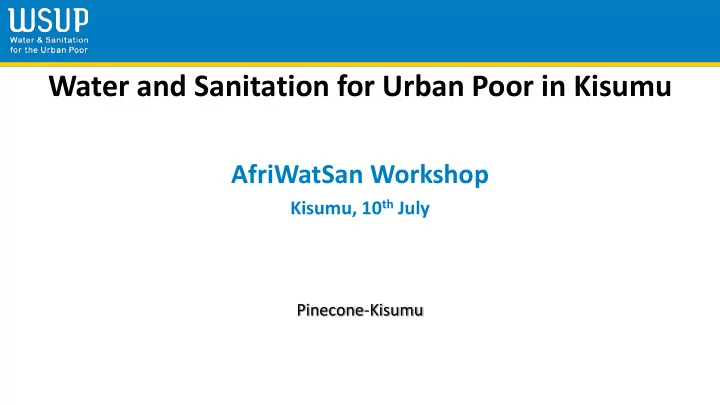

Water and Sanitation for Urban Poor in Kisumu AfriWatSan Workshop Kisumu, 10 th July Pinecone-Kisumu
Sustainable cities must have reliable access to safe drinking water and adequate sanitation!
In response… Water & Sanitation for the Urban Poor (WSUP) focuses on developing commercially viable models to helping transforming cities to benefit millions who lack access to water and sanitation.
Where do we work? WSUP is a global organization, working in five different countries.
What are we doing? • WSUP is a not-for-profit company that helps transform cities to benefit the millions who lack access to water and sanitation. • The company was created in 2005 as a response to the urban explosion that has left many cities unable to provide basic services, such as access to a toilet or drinking water, to low- income communities. • We work alongside local providers, enabling them to develop services, build infrastructure and attract funding so that they can reach low-income communities. • To ensure that services can reach as many people as possible, and will exist over the long- term, we have a strong focus on financial viability. This means working with utilities and businesses to build services which generate revenue whilst reaching the most vulnerable urban residents, and advising regulators and governments on how to create an environment which enables businesses to succeed. We use limited grant funding to conduct market research and business development with the intention of creating a business that is financially sustainable.
Kisumu City Sanitation • Sewer coverage in Kisumu has been estimated at less than 15% and majority of people in the informal settlements in Kisumu use pit latrines as the main sanitation facility. • Approx 73% of the landlords in LIC use manual pit emptiers while only 6% use SUPPORT EXISTING ON-SITE SANITATION exhausters for pit emptying. ENTERPRISES IN KISUMU • The main reason most of the landlords use manual emptiers is that, 60% of the pits are unlined and most of them have got loads of solid waste hence making it difficult to use exhausters.
Modalities of Engagement • A research carried out by WSUP Kenya in Kisumu in 2015 found out that formalizing a pit latrine emptying service would provide the largest market for improving the level of sanitation in low-income areas of Kisumu. • Over 60% of the households in the Low Income Areas of Kisumu use pit Latrines • WSUP focuses its effort on aiding entrepreneurs to mobilize their businesses, with the hopes of expanding into exhaustion/sewer and even the sale of sanitation products down the road. • The targeted areas are Nyalenda A&B, Manyatta and Obunga.
Capacity Building to Entrepreneurs The initial capacity building at the start of the business model includes-; • Purchasing of basic equipment to make the task more safe, hygienic and professional • Demand generation for the service through marketing activities • Training on improved business practices - compliance with the requisite regulations, the licensing regime and all other statutory requirements for local businesses.
Support to Institutions (KIWASCO& CGK) For a stronger enabling environment for Sanitation enterprises in Kisumu to exist, WSUP work alongside private operators for support by engaging KIWASCO in -; • Promoting simplified and effective licencing regime • Establishing appropriate Faecal Sludge Treatment, Re-Use & Disposal Area • Scoping Viability of Energy Generation Re-Use of Faecal Sludge • Supporting Coordination of Exhauster Businesses & Control of Illegal Dumping • Supporting Drafting and Implementation of County Laws and Regulations
Water Sector Interventions • WSUP improves services by working side-by-side with local providers • In partnership with KMT and TCCAF , our interventions aim at implementing Market-led approach for BoP services expansion targeting low income areas • WSUP aims at influencing increased public & private sector investment and commitment on BoP service expansion by prioritizing water agenda in the country's development blueprint • Engage the utility to adopt an effective structure for reporting for management of BoP consumers
• Support County of Kisumu to develop a pro-poor focused service provision water Act • Support the utility to develop systems for BOP data collection, analysis, reporting and decision making • Support in development and implementation of demand creation and consumer communication strategies for water connections (Last yard) in LIAs • Support utilities to promote last yard connections and increase revenue collection • Support utilities to develop consumer engagement strategies
Cont ’ • Work with entrepreneurs to promote the penetration of technologies into Bop segment through capacity building on business for increased revenue • Create linkages between KIWASCO and technology providers for test runs to help identify workable technology (B2B) • Support utilities in marketing the workable technologies to master operators/DMMs for adoption • Support KIWASCO/DMMs to develop consumer engagement strategies
Recommend
More recommend